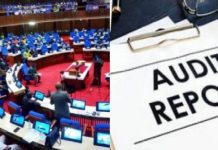Africa-Press – Sierra-Leone. IT IS THAT TIME of the year when African presidents yell at their citizens about how they will make the year a better one – then shamelessly bury their faces at the end of that year. What about doing something about bad land habits that urgently need changing?
A habit is any action we do so often that it becomes an involuntarily spontaneous response to a desire.
A bad land habit is any undesirable action we employ in our effort to solve land challenges which directly or indirectly lead to poor living conditions for our people.
For instance, all habitual actions that lead to land degradation and deter access to land (including water, food, energy and housing) are bad habits.
Some typical land habits in Africa are deforestation (tree cutting), the proliferation of land/forest and mining concessions by governments who consistently contract private companies to extract minerals from public land.
Others include the flagrant exploitation of land issues through climate change and environmental activism as money-making ventures by individuals and corporations.
Land resources (especially soil, water and biodiversity) provide the foundation for the wealth of African nations and economies.
They are the primary sources for meeting the growing needs and desires for food, water, and energy.
Compared to other continents, Africa grows its economy with large-scale land developments. How we manage and use these natural resources threatens our health and continued survival.
NEGATIVE TRENDS
The bad land habits driving Africa to the precipice of human and economic development are many. Several scenarios reflect our situation.
Africa’s most populated country and biggest economy, Nigeria, is characterised by oil pipelines that litter its oil-producing communities, environmental degradation (a sign of disregard for the consequences of oil exploitation), and booming natural resource conflict situations.
In less populated Namibia, citizens wait for when their land will be finally redistributed (through land reform) to enable them to start an economic journey to the future they have hoped for since independence.
In Ghana, the chiefs (who control up to 80% of the country’s land) remain at constant but quiet loggerheads at ensuring that they continue to fully hold the land for their respective communities lest it falls into the hands of a government whose land policy they perceive to be too precarious for their development.
For Zimbabwe, there is still a need to amend the mistakes of hurried land reform (or tap its opportunities) for the benefit of citizens.
In Ethiopia, a constitution that puts land in the control of the state and its people has left administrators in a continuous struggle concerning how to let the people exercise their right of control over land resources.
BOUNDARIES
Scientists agree there are nine planetary boundaries we must neither deplete nor reach.
(1) Ocean acidification (an increase in acids in ocean water): This is mandatory for the development of marine life.
(2) Land system change (the conversion of land from one use to another): This is crucial because it can be the driving force for efficient land use and a barrier to achieving efficient resource use.
(3) Freshwater cycle and consumption: If consumed responsibly, it can lead to the Earth’s resilience.
(4) The ozone layer that protects humans from the sun’s excessive rays.
(5) Chemical pollution due to the emissions of toxic substances that have irreversible effects on humans, animals and our physical environment.
(6) Atmospheric aerosol loading: This may be caused by emitting hazardous gases into the environment.
(7) Nitrogen and phosphorus flow into oceans, which can lead to the decline of marine animals.
(8) Biodiversity loss and extinctions are the main determinants of food, water, and natural resource availability. Severe biodiversity loss leads to reduced food, water and natural resources availability.
(9) Climate change, which accelerates the Earth’s warming and intensifies the climate impacts.
INNOVATION
Of the nine planetary boundaries that define a ‘safe operating space for humanity’, four have already been reached worldwide, including in Africa.
These are land use changes, climate change, biodiversity loss, and nitrogen and phosphorus flow into oceans.
Across the continent, over-dependence of local communities on bush-meat hunting for their protein needs remains an issue.
Human economic activities are still hinged on unsustainable subsistence agricultural practices. In addition, commercial agricultural practices expand into Africa’s forest land and critical wildlife areas.
All African governments promote one form of European-on-demand land-based initiative (projected to bring prosperity to citizens) or the other. They fail to be open about the social and environmental risks of embracing such initiatives.
We must start reducing our agricultural land use and become more innovative in using land beyond agriculture and mining.
After hundreds of years of natural resource exploitation by external agents, this is crucial.
The year 2023 should be a starting point for Africa to look inward for solutions to its development challenges, not a new year of continued bad land habits.
– Uchendu Eugene Chigbu is an associate professor (land administration) in the Department of Land and Spatial Sciences at the Namibia University of Science and Technology. The views expressed here are entirely his, and not those of Nust.
For More News And Analysis About Sierra-Leone Follow Africa-Press






